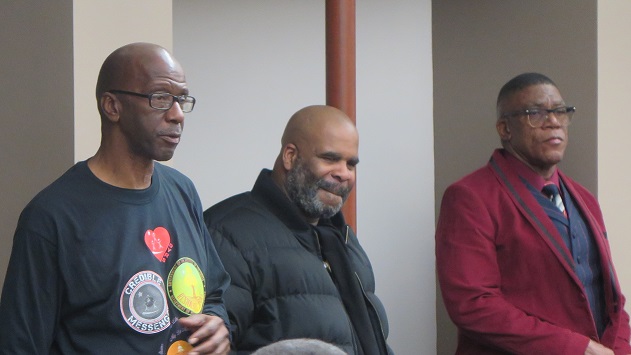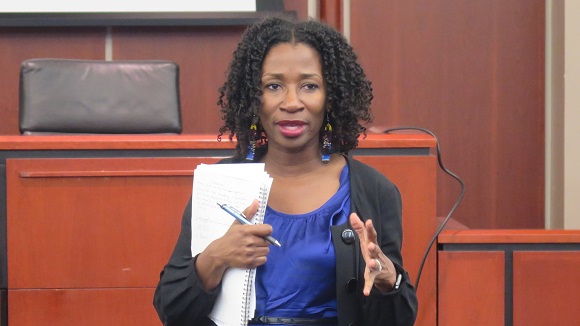Clinton Lacy, Director of the District of Columbia Department of Youth Rehabilitation Services speaks at Rutgers Law School.
Leaders from Washington D.C. who work with alternatives to incarceration for youth, including former founding members of the Crips and Latin Kings gangs spoke to Professor Victoria Pratt’s class “Problem Solving Justice” about The Credible Messenger Initiative. This initiative partners incarcerated youth with mentors and social services as an alternative to their custodial sentence.
Some of the most powerful remarks came from former gang leaders, who had spent time in prison, but now devote their time to helping youth offenders stay out of jail.
Melvin Farmer, an original member of the Crips Gang who spent 30 years in prison, talked about getting a message to ex-offenders about getting out of gang life, “We can create a dialogue that nobody can. They may not do what we tell them, but they will listen. We can get them to come to the table.”
Former admitted gang leaders spoke about their efforts to keep youth out of jail, including Melvin Farmer, far left.
Another speaker was Antonio Fernandez, CEO of Grow Up and Grow Out, who used to be known as “King Tone” of the Latin Kings. Fernandez said he tries to give young former offenders the support they need to stay out of jail – including free meals, help finding jobs, and mentorship from adults, “We’re giving people what they’re missing, what would have helped them.”
The Credible Messenger initiative is part of the District of Columbia Department of Youth Rehabilitation Services, driven by Director Clinton Lacey. Lacey said his department works with 21 grassroots organizations to provide mentoring and support for young offenders. “We’re re-imagining what justice is and what it can be, especially for the most disenfranchised in society who are struggling with poverty, substance abuse, neglect and racism.”
Lacey said young people who participate in the program show a low rate of recidivism. Each young person – usually aged 16-24 – is paired with a case manager. Lacey said through the Credible Messenger program, the “messengers,” who go through an intensive training program and are monitored by supervisors, may meet with young adult’s family members, offer support to single parents, check in on the young person, be on called for crisis situations, and offer other kinds of support to keep the young person out of jail.
Another former offender, Norman Brown, who said he served a 24-year-sentece and received clemency from former President Barack Obama, but now works to keep others out of jail, said, “We don’t blame. Many think it’s a rite of passage to go to prison. We have to deprogram them and build a rapport (with) them. They let their guards down and trust us, one on one.”
Professor Pratt, formerly Chief Judge of the Newark Municipal Court, is well-known for her work with restorative justice and criminal justice reform. Pratt worked with the city’s Community Court pilot project that matched people arrested with needed services, such as mental health assessment, treatment for addiction and job resources.
Professor Victoria Pratt, a former judge, teaches the course, "Problem Solving Justice."

